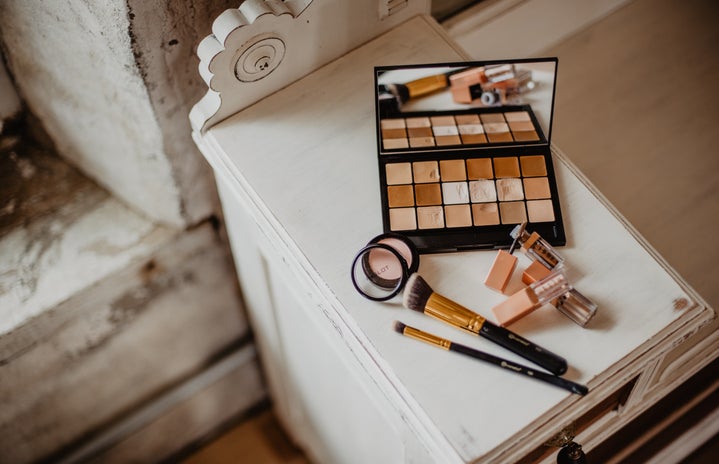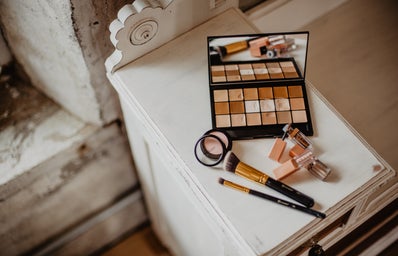The other day, my dad and I were discussing the differences between men and women when it comes to “getting ready,” and almost immediately afterward I came across this TikTok by Yahri Shavers in which she discussed her thoughts on this very topic. I, like most women, am very aware of this distinction and am reminded of it every time I find myself scrambling to define my cheekbones or elongate my eyelashes like my life depends on it. Don’t get me wrong, I absolutely love doing my makeup. I find the process almost relaxing, and I undoubtedly find joy in taking the time to paint on a perfected version of my face. When I was in high school, and my parents finally agreed to allow me to wear makeup, I happily woke up at 5 a.m. every day to do my makeup before school, experimenting with new eyeshadow colors every day.
Makeup was first worn by the ancient Egyptians, of all genders, as a way to appeal to the gods, and we see evidence of it being used across many different cultures for various reasons. Today, it is one of many ways we perform gender on a daily basis. Gender performance has become a very polarizing and controversial point of discussion over the past couple of years, especially with the current rise in transphobia and anti-LGBTQ+ sentiments. Transphobes will often use the argument that transgender individuals are simply performing gender stereotypes, rather than actually being that gender, and honestly, I find it ironic that transphobic rhetoric often revolves around gender being innate, and not a performance, because the implication that cisgender individuals are not subjected to the same expectation to perform their gender, could not be further from the truth. I like to believe that making that connection can help bridge the gap between cisgender and transgender communities; everyone has gender-related struggles, to some extent, and gender performance is, more often than not, one of those struggles.
When women “get ready” to go out, they are essentially participating in a performance; a physical manifestation of their gender. Makeup, hair, body hair, nails, etc. are all tools we use to communicate to the outer world who we feel we are, and that carries a different weight for different people.
Unfortunately, we don’t live in a world that’s very forgiving to those who don’t conform, which often makes participating in this performance not feel like a choice.
I believe an important part of this conversation is the disparity between being masculine and feminine presenting. When you are feminine presenting, the general expectation is that you have a full face of makeup on, no body hair, and beautifully manicured nails, and a shortcoming on one of these almost feels like a failure, like something you should be able to effortlessly fit into your daily life. Those on the masculine side of the spectrum only need to present a lack of these things to fit their criteria.
Of course, there is no real penalty for not wearing makeup or having body hair, and as I’ve gotten older, I stopped forcing myself to engage in these things when I don’t feel like it, but I could never deny that I feel infinitely better about myself when I fully engage with the performance, and that’s where it gets conflicting for me.
I would never deny myself the joy of doing something I genuinely enjoy to prove a point. While I think it is completely unfair that women are expected to remove all body hair, a process that is extremely tedious, costly, and sometimes painful, I also prefer shaving certain parts of my body. I have, however, learned to let go of the shame that comes with not shaving. I can recognize that societal expectations have a huge impact on my preference, but that hasn’t caused a radical change in my shaving habits. If I stop shaving completely to defy that societal expectation and make myself uncomfortable in my body as a result, aren’t I still forcing myself to conform, just to a different standard? I find myself dwelling on that question a lot. Choice feminism supports the notion of reclaiming the joy, and possibly empowerment, that comes with doing your makeup, shaving, etc., but the radical route would be to completely disengage from gender performance; not giving into any of the additional expectations placed on you as a woman. I think the “no ethical consumption under capitalism” philosophy is very applicable here. Either route you take essentially leads to the same patriarchal destination, and scrutiny will be there regardless of how you present. At the end of the day, I enjoy sitting down to do my makeup, paint my nails, and having hairless legs when I wear dresses, and I’m not willing to deny myself those things to make a point that will never be heard.
Yahri Shaver’s TikTok discusses this topic and its implications within dating. Shaver shares her reasons for having very rigid expectations when it comes to first dates with men, stating she “doesn’t do coffee or drink dates” and only accepts dinner dates. This statement might come off as off-putting to some, but I think Shaver’s first date boundaries are a great example of engaging in the expected gender performance, while still implementing your feminist values in everyday life. Yahri goes on to share some of the reasons for this standard she set, and she makes the crucial point that it is significantly more costly for her to get ready for the date, and it is only reasonable to expect that the remaining cost would fall on the man, who simply showered, put on an outfit, and maybe shaved to get ready for the date. I fully agree with her argument, and I too am of the opinion that the man should pay for the first date (in heterosexual relationships). The time and effort that goes into getting ready for a date, as a woman, as well as the cost of products, covers the cost of a meal and more. Debates about splitting the bill on the first date are yet another example of women being demanded to do labor that goes unseen and ignored.
Getting dressed up for a date is fun, but it is also hours of work and hundreds of dollars worth of products. Being asked to split the bill is a sign that that effort is not seen and appreciated by your date. A date is realistically the only scenario where you can reasonably be “reimbursed,” in a sense, for putting in that extra work. The same double standard exists in the workplace, for example. We can reasonably assume that, in many fields, women put in more time getting ready for the work day, as opposed to their male counterparts who simply put on a suit, yet take home the same pay if not, more. Asking for higher pay to accommodate for the additional time getting ready would be seen as a ridiculous request and revoking the extra time getting ready, and showing up to work barefaced with your hair undone, would be seen as a shortcoming. Women who work in professional settings are then left with no choice but to begrudgingly wake up an hour or two earlier than their male colleagues to get ready. With that in mind, expecting the man to foot the dinner bill doesn’t seem quite as shallow, but rather a practice of self-respect, demanding what we know we are owed by the patriarchy.
When it comes down to it, there is nothing we individuals can do that will override years and years of patriarchal thinking and unfair beauty standards. Individual choices like wearing makeup or shaving hold weight in our current societal structure, no doubt, but society will never be restructured through the choices of individuals. When I get ready for the day, I have learned to let go of the shame that comes with not looking dolled up enough. Some days the effort is simply not worth it, and other days, sitting down to do my makeup is all I’m looking forward to. Is that hypocritical of me? Maybe, it is. But I think I’ve come to the conclusion that there is no point in giving up things I like for the sake of being a hypocrite. Misogyny will be there whether I wear makeup or not. The fear of being a hypocrite is important, it keeps us accountable, but shouldn’t necessarily be a motivator. Beauty standards are inherently hypocritical and unfair, and quite frankly, I’m tired of pressuring myself to engage with them “correctly.”


